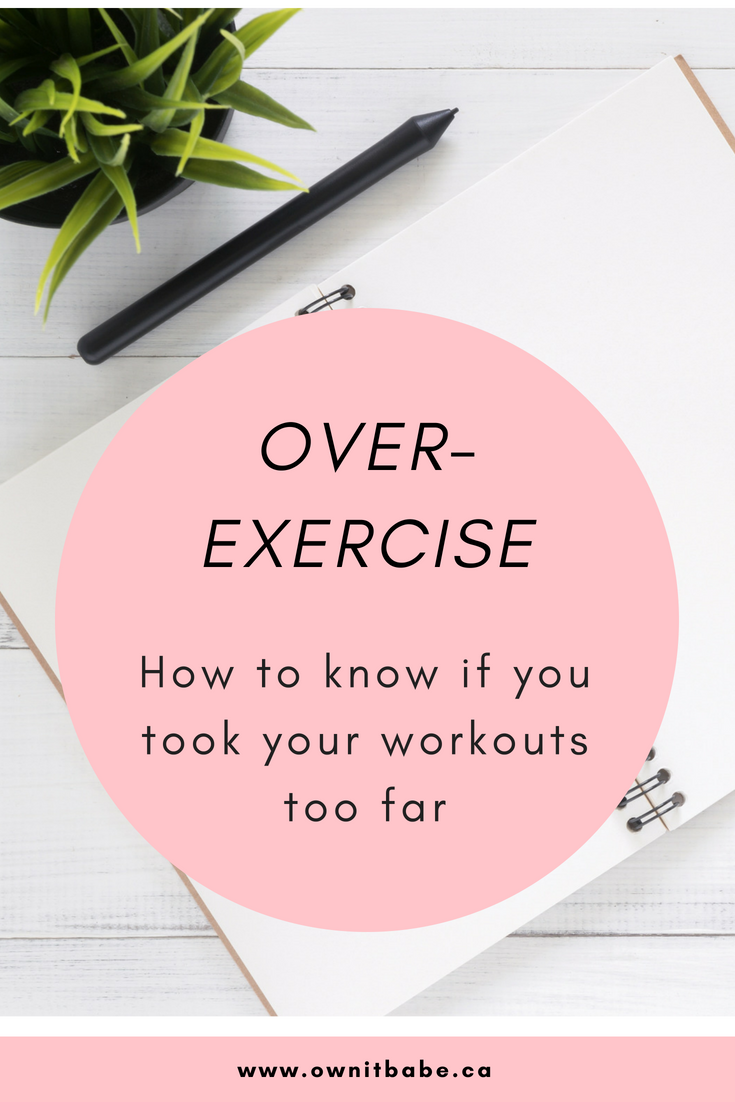
5 Signs you are overexercising and how to fix it
How do you know that you took your exercise regime too far?
Here is what my life looked like a year ago. I exercised for about 1-2 hours per day and tracked my food and macronutrients in order to stay in a caloric deficit. I stayed in a caloric deficit for about 10 years, with several binge episodes in between. In previous blog posts, I have talked a lot about disordered eating, but how about an exercise addiction that you are totally unaware of?
We often overlook the consequences of too much or too intense exercise. You might feel tired or sore, but think that this is something to celebrate. you worked out so hard and now you are sore – yay? Muscle soreness is okay and pretty common, especially when you switch up your exercises in the gym or try a new type of workout. However, there are other signs to look out for and I speak from experience on all of them. I don’t intend to get very science-y on my blog, so I am going to do my best to break it down for you into very simple terms.

1. You have trouble falling or staying asleep
You might wonder how sleep and overexercising are related. Doesn’t exercise help you to sleep better? Yes, the right amount of movement and exercise does improve your quality of sleep, but here is what over exercise does to your body:
In order to understand our body better, we need to realise that our bodies still think that we live in ancient years. They don’t understand that we go to gyms and restrict food in order to look a certain way. What they do understand is that food is either available or scarce. We either spend time resting and things are good or we are being chased by 15 tigers at a time, because we spend hours moving our body in a painfully intense way. Our bodies either sense danger or they sense relaxation and balance.
When you over exercise, our body goes into danger-mode. It wants to keep you from falling into a deep sleep, because there might be some more tigers on the way. You might wake up 5 times during the night or need 3 hours to fall asleep. This is your body trying to tell you “Danger danger danger, we need to stay alert!”
2. Your muscle soreness is ongoing and you experience injuries more frequently
Exercise puts stress on our bodies. A certain amount of stress is a good thing, because it keeps our muscles from deteriorating, keeps our bones strong and keeps our bodies fit and active way into our older years. But too much of anything can be damaging. Like I said earlier, our bodies are designed to sense danger, when we move them too much. They start breaking down on us, when the stress is too high. They can only go so long running away from tigers and cheetahs, before the stress gets too high.
If you suffer from ongoing muscle soreness that lasts over 5 days, or you experience a lot of little injuries from your workouts – such as sore wrists, ankles, muscle spasms – it might be time to reduce your exercise.
3. You haven’t had your period in a while
This is a topic near and dear to my heart. I didn’t have a steady period for almost ten years. Including not having my period at all for about two years. My body didn’t feel save enough to put a baby into the world, which essentially is why your period exists. (Again, I am breaking it down into the simplest terms)
It really all comes down to the basic functions in our body and how our body deals with too much stress. When food is scarce and we are being chased by a predator, our body wants to keep us from reproducing. It makes a lot of sense.
It took me a long time to get my period back and I had to do the two things that scared me the most. Eating more and exercising less. So much so that I stopped exercising completely for about 6 weeks and only reintroduced it very gently and slowly. I almost doubled my food intake and it was hard seeing my body change. But every body feels safe at a different weight, so a BMI scale is not helpful when determining your “ideal weight”
4. You are gaining or losing weight drastically
Every body deals differently with stress. With a high amount of exercise and a low amount of energy coming in, some bodies hold on to every single calorie, just in case. They are very protective of us and don’t want us to suffer from starvation. Other bodies release a lot of energy aka stored fat in order to keep us going through this hard time. Again, our bodies still live in ancient years and all they know is that we are either safe or we could potentially die. They don’t know that we are trying to lose weight intentionally. All they are worried about is our survival.
If your body is changing dramatically in one way or another, it could potentially be a sign of over exercise. In my case, I started to put on weight, even though I was eating less food and was amping up my exercise. My body was exhausted and holding onto everything it could for dear life.
5. You suffer from anxiety and depression
Our bodies are designed to move. The right amount of movement will battle anxiety and depression. However, if you take it too far, your body might exacerbate your mental health struggles. I may sound like a broken record now, but too much stress keeps our body in protection mode. Anxiety and depression are caused by mental or physical stress. Over exercise is extreme physical stress and puts your hormones out of balance. This may lead to mood swings and an imbalance of chemicals in your brain.
So, you suffer from some or all of these symptoms – Now what?
A balanced approach to exercise is your ultimate goal, but it may sound very arbitrary. What I highly suggest is that you play around with your routine. Cut your workouts in half and reduce the intensity. Personally, I had to stop doing sprints for a while and super-setting all my exercises with two minutes of burpees. To this day, the intensity of my workouts is not nearly the same as it used to be.
Do I miss it? Yes, I do. But my health is more important than doing strenuous exercise in order to feel accomplished. Try taking a break from your workouts for a week and see if any of the symptoms improve. It may make sense to speak with your doctor or functional medicine practitioner about this and see if they can offer any valuable advice.
I can only speak from my own experience, but cutting down my exercise – while really hard to do – was the best thing I could have done for my physical and mental health.



